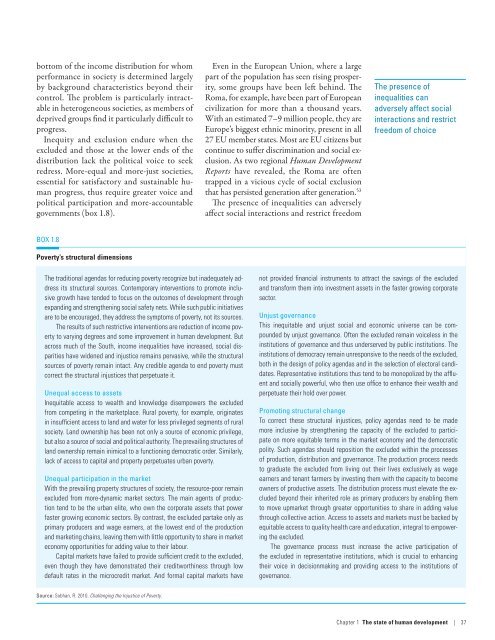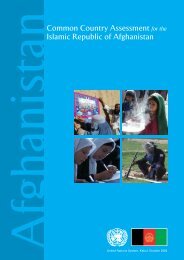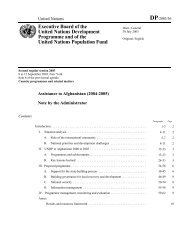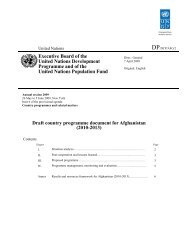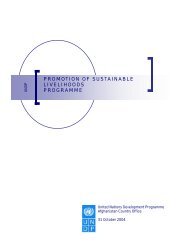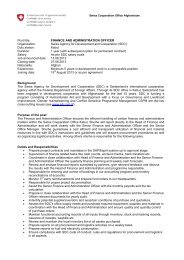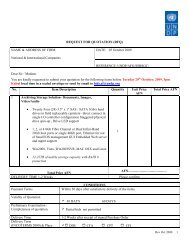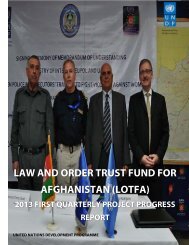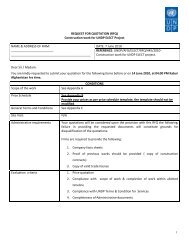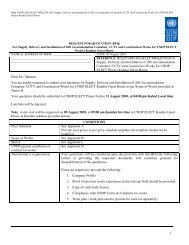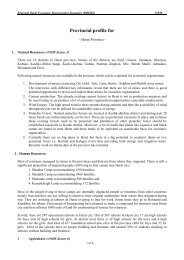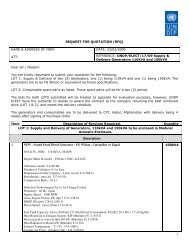E N S W - Human Development Reports - United Nations ...
E N S W - Human Development Reports - United Nations ...
E N S W - Human Development Reports - United Nations ...
You also want an ePaper? Increase the reach of your titles
YUMPU automatically turns print PDFs into web optimized ePapers that Google loves.
ottom of the income distribution for whom<br />
performance in society is determined largely<br />
by background characteristics beyond their<br />
control. The problem is particularly intractable<br />
in heterogeneous societies, as members of<br />
deprived groups find it particularly difficult to<br />
progress.<br />
Inequity and exclusion endure when the<br />
excluded and those at the lower ends of the<br />
distribution lack the political voice to seek<br />
redress. More-equal and more-just societies,<br />
essential for satisfactory and sustainable human<br />
progress, thus require greater voice and<br />
political participation and more-accountable<br />
governments (box 1.8).<br />
Even in the European Union, where a large<br />
part of the population has seen rising prosperity,<br />
some groups have been left behind. The<br />
Roma, for example, have been part of European<br />
civilization for more than a thousand years.<br />
With an estimated 7–9 million people, they are<br />
Europe’s biggest ethnic minority, present in all<br />
27 EU member states. Most are EU citizens but<br />
continue to suffer discrimination and social exclusion.<br />
As two regional <strong>Human</strong> <strong>Development</strong><br />
<strong>Reports</strong> have revealed, the Roma are often<br />
trapped in a vicious cycle of social exclusion<br />
that has persisted generation after generation. 53<br />
The presence of inequalities can adversely<br />
affect social interactions and restrict freedom<br />
The presence of<br />
inequalities can<br />
adversely affect social<br />
interactions and restrict<br />
freedom of choice<br />
BOX 1.8<br />
Poverty’s structural dimensions<br />
The traditional agendas for reducing poverty recognize but inadequately address<br />
its structural sources. Contemporary interventions to promote inclusive<br />
growth have tended to focus on the outcomes of development through<br />
expanding and strengthening social safety nets. While such public initiatives<br />
are to be encouraged, they address the symptoms of poverty, not its sources.<br />
The results of such restrictive interventions are reduction of income poverty<br />
to varying degrees and some improvement in human development. But<br />
across much of the South, income inequalities have increased, social disparities<br />
have widened and injustice remains pervasive, while the structural<br />
sources of poverty remain intact. Any credible agenda to end poverty must<br />
correct the structural injustices that perpetuate it.<br />
Unequal access to assets<br />
Inequitable access to wealth and knowledge disempowers the excluded<br />
from competing in the marketplace. Rural poverty, for example, originates<br />
in insufficient access to land and water for less privileged segments of rural<br />
society. Land ownership has been not only a source of economic privilege,<br />
but also a source of social and political authority. The prevailing structures of<br />
land ownership remain inimical to a functioning democratic order. Similarly,<br />
lack of access to capital and property perpetuates urban poverty.<br />
Unequal participation in the market<br />
With the prevailing property structures of society, the resource-poor remain<br />
excluded from more-dynamic market sectors. The main agents of production<br />
tend to be the urban elite, who own the corporate assets that power<br />
faster growing economic sectors. By contrast, the excluded partake only as<br />
primary producers and wage earners, at the lowest end of the production<br />
and marketing chains, leaving them with little opportunity to share in market<br />
economy opportunities for adding value to their labour.<br />
Capital markets have failed to provide sufficient credit to the excluded,<br />
even though they have demonstrated their creditworthiness through low<br />
default rates in the microcredit market. And formal capital markets have<br />
not provided financial instruments to attract the savings of the excluded<br />
and transform them into investment assets in the faster growing corporate<br />
sector.<br />
Unjust governance<br />
This inequitable and unjust social and economic universe can be compounded<br />
by unjust governance. Often the excluded remain voiceless in the<br />
institutions of governance and thus underserved by public institutions. The<br />
institutions of democracy remain unresponsive to the needs of the excluded,<br />
both in the design of policy agendas and in the selection of electoral candidates.<br />
Representative institutions thus tend to be monopolized by the affluent<br />
and socially powerful, who then use office to enhance their wealth and<br />
perpetuate their hold over power.<br />
Promoting structural change<br />
To correct these structural injustices, policy agendas need to be made<br />
more inclusive by strengthening the capacity of the excluded to participate<br />
on more equitable terms in the market economy and the democratic<br />
polity. Such agendas should reposition the excluded within the processes<br />
of production, distribution and governance. The production process needs<br />
to graduate the excluded from living out their lives exclusively as wage<br />
earners and tenant farmers by investing them with the capacity to become<br />
owners of productive assets. The distribution process must elevate the excluded<br />
beyond their inherited role as primary producers by enabling them<br />
to move upmarket through greater opportunities to share in adding value<br />
through collective action. Access to assets and markets must be backed by<br />
equitable access to quality health care and education, integral to empowering<br />
the excluded.<br />
The governance process must increase the active participation of<br />
the excluded in representative institutions, which is crucial to enhancing<br />
their voice in decisionmaking and providing access to the institutions of<br />
governance.<br />
Source: Sobhan, R. 2010. Challenging the Injustice of Poverty.<br />
Chapter 1 The state of human development | 37


